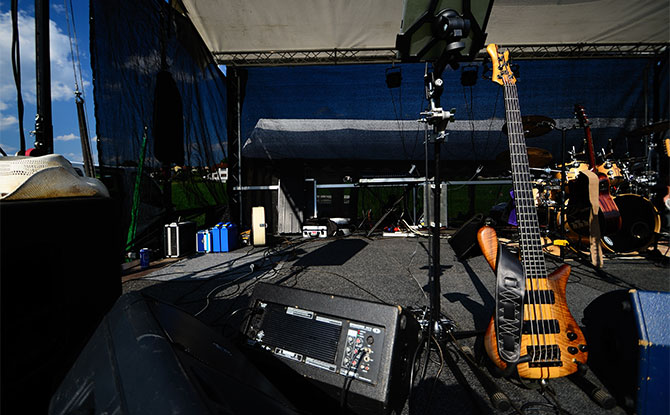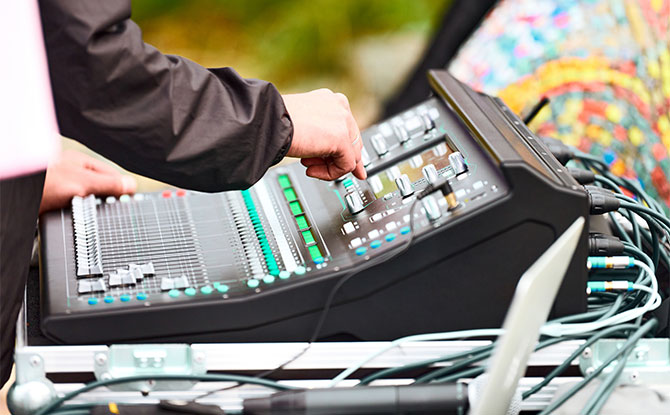A live sound operator plays a crucial role in the production of live events, ensuring that the sound quality is optimal for both the performers and the audience.
Roles & Responsibilities of a Live Sound Operator
A live sound operator plays many different roles making sure that all the aspects that have to do with sound during an event run smoothly. This begins even before anyone else steps into the event venue and extends to when everyone else has left. It is not uncommon to say that the sound team is the first in and last out of a venue.
In a larger team, there may be different aspects of sound operations. This could be because there is more equipment to be managed that is beyond the ability of a single person, or that there are multiple hands that can help out. Nonetheless, even when there are multiple people involved in the different roles, it should who is singularly responsible for each assigned task. This will allow for greater accountability.
Here is a look at the various roles and responsibilities of live sound operations.
1. Maintain Equipment

Maintaining the equipment is an essential responsibility of a live sound operator. It ensures that the live sound systems function optimally, providing high-quality sound and minimizing technical issues during live events.
This is a responsibility that takes place before an event and is critical to ensure that the sound team can trust and rely on the equipment during an event.
The live sound operator should regularly check the equipment for any damage or malfunctions. This includes inspecting cables for frayed or loose connections, testing microphones for proper functioning, and checking power sources for any issues.
Proper storage and transportation of the equipment are equally crucial. The live sound operator should ensure that the equipment is stored in a dry and secure location to prevent potential damage. When transporting the equipment, it should be packed and handled carefully to avoid any accidents or impact-related damage.
Regular cleaning is important to prevent the buildup of dirt, dust, and debris that can affect the performance of the equipment. A clean live sound system not only improves sound quality but also extends the lifespan of the equipment.
By performing regular maintenance, cleaning, and checks, the live sound operator can ensure that the equipment is in top condition, providing reliable and high-quality sound for every live event.
2. Work with Production Team to Understand Event Flow

Collaboration between live sound operators and the production team is crucial to ensure a seamless event flow. By working closely together, the live sound operator can gain an in-depth understanding of the event’s schedule, any changes in the program, and the specific audio requirements for each act.
Effective communication between the live sound operator and the production team allows for smooth coordination and seamless audio transitions throughout the event. By maintaining an open line of communication, the team can anticipate and prepare for any last-minute changes or adjustments that may arise.
For example, if there is a sudden change in the performance order, the live sound operator needs to be aware of this to make the necessary adjustments to the sound equipment. Similarly, if a particular act has specific audio requirements, such as certain effects or instrument levels, the production team can provide this information to the live sound operator in advance to ensure a high-quality sound experience for both performers and the audience.
By fostering collaboration and understanding with the production team, live sound operators can contribute to the successful execution of the event, creating a memorable and immersive sound experience for everyone involved.
3. Setup of Equipment

Setting up the equipment is a crucial part of a live sound operator’s responsibilities. It involves a series of steps to ensure that everything is properly configured for sound production. Attention to detail and organization are key during this process to guarantee that the live sound system is set up correctly and ready for a seamless performance.
First, live sound operators need to arrange the sound system according to the venue specifications. This includes positioning the speakers strategically for optimal sound coverage throughout the space. Next, they must connect the cables, ensuring that each connection is secure and free from any loose connections or interference.
Positioning the microphones accurately is another vital aspect of the setup process. Live sound operators need to consider the type of microphone and its specific application to position it correctly for capturing the best sound quality. They must also carefully adjust sound levels to find the perfect balance between different audio sources.
It is critical for live sound operators to be familiar with various types of sound equipment and their setup requirements. This knowledge allows them to handle different equipment seamlessly and troubleshoot any issues that may arise during the setup process.
Overall, the setup of equipment requires expertise, technical knowledge, and efficient organization. By meticulously following each step, live sound operators can ensure that all equipment is correctly configured, providing the audience with exceptional sound quality and a memorable live sound experience.
4. Conduct Sound Checks

Sound checks are an essential part of live performance preparation, ensuring that the sound quality is optimal for the audience. Live sound operators play a crucial role in conducting these checks, adjusting audio levels, testing equipment, and ensuring a balanced and clear sound. Collaborating with performers, they address specific sound preferences or requirements to tailor the sound experience. These sound checks allow for the identification and resolution of any technical issues before the event begins, resulting in a smooth and high-quality sound experience for the audience.
5. Manage, Mix, and Troubleshoot during Event

During live events, live sound operators play a crucial role in the management of audio production. Their expertise ensures that the sound quality remains optimal throughout the event. They continuously monitor the sound levels, making real-time adjustments to ensure balanced and clear audio. By skillfully mixing different audio sources, live sound operators create a cohesive sound experience for the audience.
However, live events are not without technical challenges. When unforeseen issues arise, live sound operators spring into action. They quickly troubleshoot any technical problems that may occur, aiming to minimize disruptions and maintain uninterrupted sound quality. Their ability to troubleshoot effectively and resolve technical issues on the spot is of utmost importance.
Whether it’s adjusting the sound levels, mixing audio sources, or troubleshooting technical glitches, live sound operators work tirelessly to provide a seamless audio experience for the audience. Their skills and expertise in live event management, sound mixing, and troubleshooting ensure that the event is a success from an audio perspective.
6. Post-event Teardown
Once the live event is over, it is the responsibility of the live sound operators to carry out the post-event teardown process. This involves carefully dismantling the equipment and ensuring its safe storage for future use. The teardown process includes disconnecting cables, packing up microphones and other gear, and organizing everything systematically.
Proper equipment storage is essential to maintain the performance and longevity of the live sound equipment. The equipment must be stored in a dry and secure location, protected from dust, moisture, and extreme temperatures. Additionally, it is important to handle the equipment with care during the teardown process to prevent any accidental damage.
Post-event dismantling also provides an opportunity to assess the condition of the equipment and identify any maintenance needs. Live sound operators should inspect the cables, connectors, and other components for any signs of wear or damage. Addressing any issues promptly ensures that the equipment remains in optimal working condition for future events.
In addition to equipment care, the teardown process also involves proper organization. Live sound operators should ensure that all cables are neatly coiled, labeled, and stored in the appropriate containers. Microphones and other gear should be packed securely to prevent any damage during transportation or storage.
By following a systematic teardown process and taking proper care of the equipment, live sound operators contribute to the smooth operation of future events. Their attention to detail and commitment to equipment maintenance ensure that each live event can be executed with the same level of professionalism and high-quality sound production.
7. Keep Updated on Audio Industry Developments

Staying informed about the latest developments in the audio industry is essential for live sound operators to excel in their roles. As technology continues to advance, it is important for professionals in the field to keep up with industry trends and embrace the latest innovations. By staying updated, live sound operators can enhance their skills, improve the quality of their work, and provide the best possible sound experience for live events.
One way for live sound operators to stay updated is by keeping an eye on audio industry developments. This involves staying informed about new technologies, such as cutting-edge sound equipment or software, that can enhance the sound production process. By incorporating the latest technology into their work, live sound operators can deliver exceptional audio quality and create a memorable experience for the audience.
Another aspect of staying updated in the audio industry is being aware of industry trends. Understanding the current trends and preferences in sound production allows live sound operators to adapt their techniques accordingly. By staying on top of trends, they can provide unique and engaging sound experiences that resonate with the audience and meet their evolving expectations.
Continuous learning and professional development are key for live sound operators to stay ahead of the game. Attending workshops, seminars, and conferences related to the audio industry provides opportunities to learn from industry experts, gain new insights, and expand their network. Additionally, online resources, forums, and communities dedicated to sound production offer valuable information and discussions on the latest advancements and techniques. Engaging in ongoing learning and professional development ensures that live sound operators are equipped with the knowledge and skills needed to deliver top-notch audio experiences at live events.
Key Takeaways: Roles & Responsibilities of a Live Sound Operator
- A live sound operator is responsible for maintaining the equipment and ensuring its optimal performance.
- Collaboration with the production team is essential for understanding the event flow and audio requirements.
- The setup of sound equipment requires attention to detail and organization.
- Sound checks are crucial for achieving high-quality sound during live performances.
- Live sound operators manage, mix, and troubleshoot the audio during the event.


